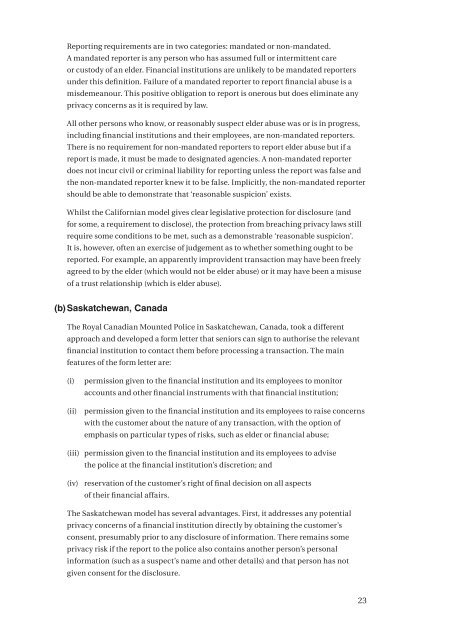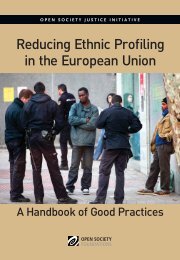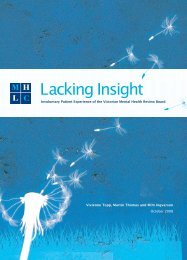Responding to the financial abuse of older people - Loddon ...
Responding to the financial abuse of older people - Loddon ...
Responding to the financial abuse of older people - Loddon ...
- No tags were found...
You also want an ePaper? Increase the reach of your titles
YUMPU automatically turns print PDFs into web optimized ePapers that Google loves.
Reporting requirements are in two categories: mandated or non-mandated.<br />
A mandated reporter is any person who has assumed full or intermittent care<br />
or cus<strong>to</strong>dy <strong>of</strong> an elder. Financial institutions are unlikely <strong>to</strong> be mandated reporters<br />
under this definition. Failure <strong>of</strong> a mandated reporter <strong>to</strong> report <strong>financial</strong> <strong>abuse</strong> is a<br />
misdemeanour. This positive obligation <strong>to</strong> report is onerous but does eliminate any<br />
privacy concerns as it is required by law.<br />
All o<strong>the</strong>r persons who know, or reasonably suspect elder <strong>abuse</strong> was or is in progress,<br />
including <strong>financial</strong> institutions and <strong>the</strong>ir employees, are non-mandated reporters.<br />
There is no requirement for non-mandated reporters <strong>to</strong> report elder <strong>abuse</strong> but if a<br />
report is made, it must be made <strong>to</strong> designated agencies. A non-mandated reporter<br />
does not incur civil or criminal liability for reporting unless <strong>the</strong> report was false and<br />
<strong>the</strong> non-mandated reporter knew it <strong>to</strong> be false. Implicitly, <strong>the</strong> non-mandated reporter<br />
should be able <strong>to</strong> demonstrate that ‘reasonable suspicion’ exists.<br />
Whilst <strong>the</strong> Californian model gives clear legislative protection for disclosure (and<br />
for some, a requirement <strong>to</strong> disclose), <strong>the</strong> protection from breaching privacy laws still<br />
require some conditions <strong>to</strong> be met, such as a demonstrable ‘reasonable suspicion’.<br />
It is, however, <strong>of</strong>ten an exercise <strong>of</strong> judgement as <strong>to</strong> whe<strong>the</strong>r something ought <strong>to</strong> be<br />
reported. For example, an apparently improvident transaction may have been freely<br />
agreed <strong>to</strong> by <strong>the</strong> elder (which would not be elder <strong>abuse</strong>) or it may have been a misuse<br />
<strong>of</strong> a trust relationship (which is elder <strong>abuse</strong>).<br />
(b) Saskatchewan, Canada<br />
The Royal Canadian Mounted Police in Saskatchewan, Canada, <strong>to</strong>ok a different<br />
approach and developed a form letter that seniors can sign <strong>to</strong> authorise <strong>the</strong> relevant<br />
<strong>financial</strong> institution <strong>to</strong> contact <strong>the</strong>m before processing a transaction. The main<br />
features <strong>of</strong> <strong>the</strong> form letter are:<br />
(i)<br />
(ii)<br />
permission given <strong>to</strong> <strong>the</strong> <strong>financial</strong> institution and its employees <strong>to</strong> moni<strong>to</strong>r<br />
accounts and o<strong>the</strong>r <strong>financial</strong> instruments with that <strong>financial</strong> institution;<br />
permission given <strong>to</strong> <strong>the</strong> <strong>financial</strong> institution and its employees <strong>to</strong> raise concerns<br />
with <strong>the</strong> cus<strong>to</strong>mer about <strong>the</strong> nature <strong>of</strong> any transaction, with <strong>the</strong> option <strong>of</strong><br />
emphasis on particular types <strong>of</strong> risks, such as elder or <strong>financial</strong> <strong>abuse</strong>;<br />
(iii) permission given <strong>to</strong> <strong>the</strong> <strong>financial</strong> institution and its employees <strong>to</strong> advise<br />
<strong>the</strong> police at <strong>the</strong> <strong>financial</strong> institution’s discretion; and<br />
(iv) reservation <strong>of</strong> <strong>the</strong> cus<strong>to</strong>mer’s right <strong>of</strong> final decision on all aspects<br />
<strong>of</strong> <strong>the</strong>ir <strong>financial</strong> affairs.<br />
The Saskatchewan model has several advantages. First, it addresses any potential<br />
privacy concerns <strong>of</strong> a <strong>financial</strong> institution directly by obtaining <strong>the</strong> cus<strong>to</strong>mer’s<br />
consent, presumably prior <strong>to</strong> any disclosure <strong>of</strong> information. There remains some<br />
privacy risk if <strong>the</strong> report <strong>to</strong> <strong>the</strong> police also contains ano<strong>the</strong>r person’s personal<br />
information (such as a suspect’s name and o<strong>the</strong>r details) and that person has not<br />
given consent for <strong>the</strong> disclosure.<br />
23
















